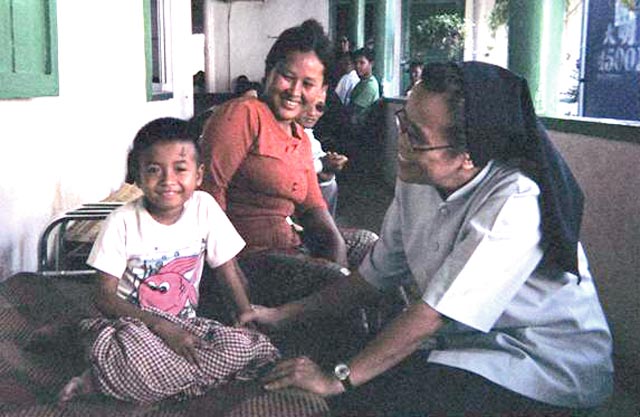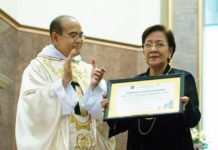
SISTER Myrna Porto of the Daughters of Charity had a three-letter answer when asked about what she saw in Cambodia, a country poorer than her own Philippines, that made her dedicate her life in service of it: “God.”
Had the Cambodians been asked as well, almost a quarter of a million of them would have said the same thing after being helped by Sister Porto.
After all, the 1970 Medical Technology graduate is the Mother Superior of the congregation in the Southeast Asian nation. She is also the administrator of the Takeo Eye Hospital, the only eye center in Cambodia.
Seeing the ‘light’
Porto, a 60-year-old native of Calabanga, Camarines Sur, admitted that she did not plan on devoting herself to God or to society before she entered UST. Like most students in the health and medicine field, her plan was to go to the United States after graduation to land herself a high-paying job.
“However, I later thought that working in the US wouldn’t express my gratitude to my family and to God,” Porto told the Varsitarian.
This faith rooted from having prayer as a habit, dating from her high-school days at Colegio de Sta. Isabel in Naga City, a Daughters of Charity-administered school. At UST, Porto became even more prayerful, making sure that she visited the University chapel at least once a day.
“It was during my stay in UST that I realized that, with my course, I could help alleviate suffering,” Porto said.
After graduating from school, Porto initially wanted to pursue a career as a medical technologist. She landed her first job in Naga City at Mother Seton Hospital. However, she soon felt discontented with her job, forcing her to hop from one province to another, from Camarines Sur to Albay and back to Camarines Sur, searching for her ideal job.
By the time she was done hopping from one job to another, Porto had acquired the needed experience to work in US hospitals.
Porto did apply for work in US hospitals, but did not follow up her applications.
“I already set my mind to join in the Daughters of Charity,” she explained.
She found “calling” during the time she was moving from one medical facility to another. The Daughters of Charity seemed to follow her around the Bicol region. The congregation’s members were rendering voluntary service to the patients in each hospital that she worked for, igniting the sense of charity that was innate in Porto.
Subsequently, Porto decided to become a nun under the Daughters of Charity, an international congregation, which St. Vincent de Paul and St. Louise de Marillac founded in 1633 in France.
“I have no preference in what way I can serve the poor,” she said. “(By becoming a nun), I knew I was finally on the right track, and that God was leading the way.”
Porto’s sudden change of profession, however, met resistance from friends and kin alike—especially her parents. They disapproved of her decision so much that Porto left for the congregation’s main establishment at the Hospicio de San Jose in Manila in July 1972 without bidding her parents goodbye. The only relative who saw her off did not even let go without a heavy heart.
“My uncle held on to my suitcase, trying to stop me from leaving,” Porto recalled. “But I told him he could have it, and he reluctantly bid goodbye as well.”
It was only the following year that the family conflict was resolved. Just before she left for her first religious mission abroad, Porto’s siblings visited her in Manila to tell her that their parents have finally accepted her decision and wished her well.
Reaching out
In Thailand, where she lived for 27 years, Porto’s first duties involved mainly clerical work and management of the congregation’s clinics and convents in the rural areas. Nevertheless, she went out of her way to be with the sick.
“I listened to their stories, shared their meals, their joys and sorrows, and buried their dead,” Porto said. “Without knowing it, I learned to take them as they are.”
In 1995, she joined an inter-faith conference held in the country where she found herself in the company of theologians and experts from the diverse religions in Asia. From the Buddhist monks to Muslim imams, among others.
“After the conference, someone from the Daughters asked me if I would like to come and manage their upcoming mission in Cambodia,” Porto said.
Porto accepted the offer in 1999, and has since headed the project.
Even as provincial Mother Superior, Porto still travels from the congregation’s mission house 75 kilometers away from the city to be with Takeo’s patients and run the hospital.
Aside from running the hospital, Porto also finds time to manage the congregation’s financial and personnel matters, oversee the training of health personnel, and have dialogues with local and foreign health ministries.
Whenever her schedule permits, she’s also a hands-on worker at the congregation’s other hospitals in other Cambodian provinces.
Still, Porto’s work is concentrated at Takeo. The past nine years of the hospital under her supervision produced more than a hundred ophthalmologists and nurses, which are badly needed in Cambodia.
“God is here,” Porto said. “And He is doing miracles in the lives of the poor and in the lives of those who listen to Him and ponder in His words.”
It has been three decades since Porto joined the Daughters of Charity. However, she knows that she would not have made it this far with the Daughters of Charity if were it not for the education she received from the Dominican-order-run institution.
“The feeling of gratitude that I experienced as a student in UST continues to inspire me to continue with what I am now,” she said.









